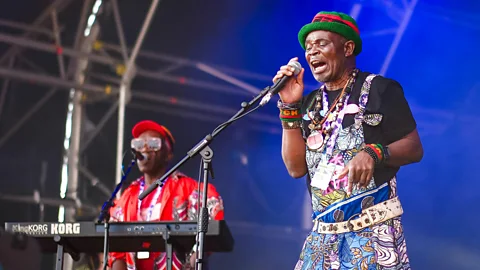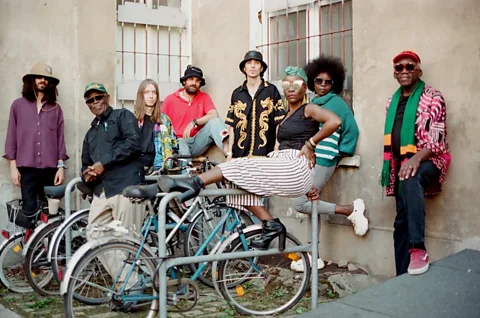'It's hard not to be blown away': The 70s rock band putting 'Zamrock' back on the map, 50 years on
 Alamy
AlamyBlending the style of The Rolling Stones with African beats and instruments, Zambian group Witch were revolutionary – then disappeared. No one could have predicted their amazing return.
In the early 1970s, Zambia produced a unique music scene of its own creation. Zamrock, as it became known, was the southern African country's take on western rock music – a take that mixed the sounds of The Rolling Stones, Jimi Hendrix and Black Sabbath with its own fuzz-guitar psychedelia and African instrumentation, beats and rhythms. Forged out of the country's independence from its British colonisers in 1964, its blossoming came during one of the most significant, fascinating and prosperous periods in Zambian history, and its decline and fall mirrored that of Zambia itself in the late 1970s and early 1980s. A once thriving local music scene became devastated by economic, cultural and health factors that also decimated the wider population, leaving Zamrock as a relic, unknown outside of its own region.
 Lizzie Austin
Lizzie AustinYet over 50 years later, Zamrock is enjoying an ongoing revival. While many of the scene's originators – acts like the influential Rikki Ilonga and his band Musi-O-Tunya, The Ngozi Family, The Peace and Amanaz – have long since either died, stopped performing or are little known, one band has brought Zamrock to a contemporary global audience. Formed in 1971, Witch (an acronym for "We Intend to Cause Havoc") were the scene's biggest and most popular band. Fronted by the charismatic Emmanuel Chanda – better known as "Jagari", a name inspired by Mick Jagger – Witch released five albums between 1972 and 1977 that epitomise the Zamrock sound. "We had the influence of rock and roll, but we were Africans, so we couldn't play the actual rock and roll," Jagari tells the BBC. "We had to fuse some things in."
Witch's unlikely rediscovery started in 2011, when Now-Again Records released a compilation of the band's music, We Intend to Cause Havoc!, leading to a resurrection that has seen Witch tour the world, release new music and become the subject of Italian film-maker Gio Arlotta's 2019 documentary, We Intend To Cause Havoc. "It's hard not to be blown away when you hear Witch," says Now-Again founder Eothen Alapatt, known as Egon. "The first two Witch records [1972's Introduction and 1974's In the Past] have this garage, Rolling Stones type of vibe to them, and those are really great. They're heavy and just really raw expressions of rock music. But then you get to the third one [1975's Lazy Bones] and out of nowhere, it becomes like this progressive psychedelic thing. I was like, 'There has to be a breadth of music here that's worth exploring.'"
The Witch revival has spread far and wide, leading to renewed interest in Zamrock as a whole. Jack White is a fan, releasing Witch live music on his Third Man Records label; Beastie Boys' Mike D, Clairo and Madlib are irers. Moreover, rappers Tyler, The Creator, Travis Scott and Yves Tumour have all recently sampled Zamrock bands, extending the genre's sphere of influence to the biggest names in cutting-edge hip hop. This week, they release a new album, Sogolo, while later this month they will become the first Zamrock band to perform at Glastonbury Festival. "Zamrock is facing a rebirth, if you like," Jagari says. "It had died down, it had sunk in oblivion. But the interest is growing."
How Witch formed
Zamrock originated amid the copper mines of northern Zambia, known then as Northern Rhodesia. Jagari had grown up in one such area, Kitwe, having moved there at the age of eight to be brought up by his older brother. "The colonial masters didn't completely neglect the black community," Jagari says, and it was at the weekend social clubs built for the miners that a young Jagari first saw music performed. "In the village, I heard people sing, and I saw them dance. Those little things stuck in my head."
Jagari would listen to a radio station in Mozambique that played the UK top 40 (often when his brother was working night shifts) as well as jukeboxes in pubs. He was part of a generation hooked on western acts, who wanted to play their music. "Whoever played the guitar during that time was judged by how well he would play [Jimi Hendrix's] Hey Joe," Jagari smiles.
Encouraged by his schoolfriends, who saw him dance and mime at local ballrooms, Jagari auditioned for the band that became Witch. He changed his name because he reminded friends of Jagger when performing, although he was initially ambivalent about making the switch. "That bothered me. I don't want to live in somebody's shadow. Yeah, he's a great man. But I'm an African and my nose is flat, and how can I be compared to someone">window._taboola = window._taboola || []; _taboola.push({ mode: 'alternating-thumbnails-a', container: 'taboola-below-article', placement: 'Below Article', target_type: 'mix' });
